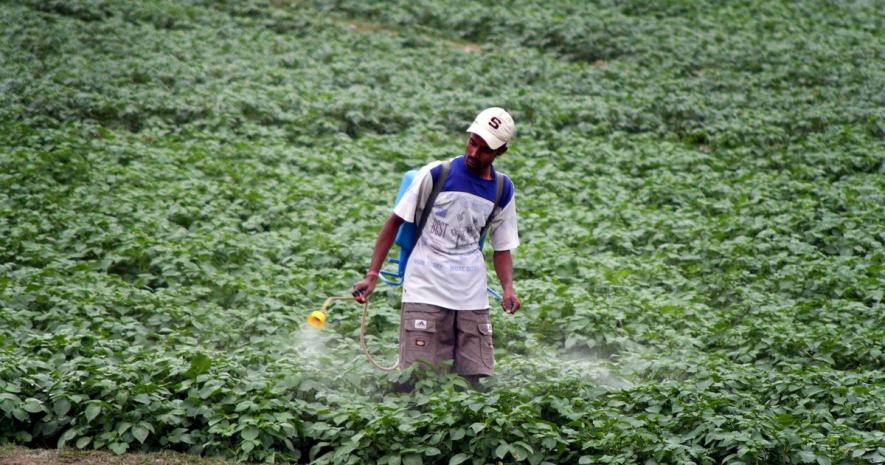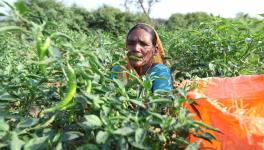6,600 Farmers Die of Pesticide Poisoning Every Year in India: Study

Representational image. | Image Courtesy: Scroll.in
In a comprehensive study published on Monday, December 8, scientists estimated that about 385 million people, particularly among farmers and agriculture workers, are poisoned by pesticides every year including 11,000 deaths per year. Among the fatalities, nearly 60% or 6,600 deaths per year occur in India.
This means 44% of the worldwide farming population (total 860 million) are poisoned by pesticides every year.
The research article titled “The global distribution of acute unintentional pesticide poisoning: estimations based on a systematic review” published in BMC Public Health is the first such global estimate since 1990. There were an estimated 25 million unintentional, acute pesticide poisoning (UAPP) cases in 1990.
“The figures reveal the gross neglect of successive governments in containing the threat of pesticide poisoning,” said Narshimha Reddy, Advisor of Pesticide Action Network (PAN) India, a non-profit organisation working for eliminating the human and environmental hazards caused by pesticides.
“Beyond the immediate deaths, most people suffer long term chronic illnesses including neurological disorders. In India, during our surveys, we find that many farmers are not even aware of their chronic conditions caused by the pesticides,” said Reddy to NewsClick.
The researchers carried out a systematic review of the scientific literature published between 2006 and 2018, supplemented by mortality data from the World Health Organisation. While a total of 141 countries are covered, worldwide UAPP was estimated based on national figures and population data for regions defined by the Food and Agriculture Organisation (FAO).
Stating that acute pesticide poisoning is an ongoing major global public health challenge, the study concludes, “There is a need to recognise the high burden of non-fatal UAPP, particularly on farmers and farmworkers, and that the current focus solely on fatalities hampers international efforts in risk assessment and prevention of poisoning. Implementation of the international recommendations to phase out highly hazardous pesticides by the FAO Council could significantly reduce the burden of UAPP.”
Also read: Protesting Farmers ‘Are Being Misled’. Really?
“The greatest estimated number of UAPP cases is in southern Asia, followed by south-eastern Asia and east Africa with regards to non-fatal UAPP,” the findings revealed.
“We realise there are limitations in the data on pesticide poisonings,” notes Javier Souza, PAN Latin America’s coordinator. “But this study clearly shows this as a serious, global problem that warrants immediate action. Highly hazardous pesticides must be phased out by 2030 to meet global Sustainable Development Goals, and we must shift to healthier and more resilient systems like agroecology.”
PAN India has been urging the Indian government to ban the usage of 27 highly hazardous pesticides including atrazine, carbofuran, chlorpyrifos, malathion, mancozeb, monocrotophos and acephates among others which have proven high acute toxicity, long-term health effects, and hazards to ecosystems.
No Government data on Pesticide Poisoning
“In India, many state governments do not even maintain the data on deaths due to pesticide poisoning and the National Crime Records Bureau also do not categorise it,” said Reddy.
On March 23, the dental government introduced Pesticides Management Bill 2020 in Rajya Sabha to replace the Insecticides Act, 1968.
“PAN India has been demanding the government to introduce a liability principle in the new bill against those responsible for unintended acute pesticide poisoning,” said Reddy.
Get the latest reports & analysis with people's perspective on Protests, movements & deep analytical videos, discussions of the current affairs in your Telegram app. Subscribe to NewsClick's Telegram channel & get Real-Time updates on stories, as they get published on our website.
























